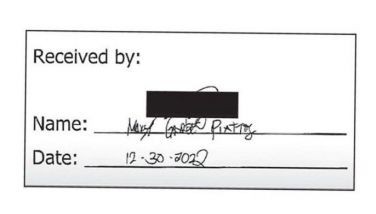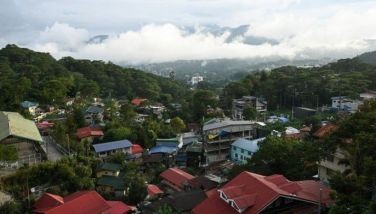Con-com wants to recommend two-party system
December 4, 2005 | 12:00am
VIGAN CITY — The presidential consultative commission (con-com) tasked by President Arroyo to propose amendments to the 1987 Constitution will likely recommend the adoption of the two-party system in its final report due Dec. 15.
Following consultations here Friday, con-com commissioner Jose Bello told The STAR that although they were not recommending the scrapping of the multi-party system, they were emphasizing the formation of a two-party system to replace it.
Bello, who led the consultation team of con-com delegates here, said a two-party system will enable small political parties to coalesce with other parties to gain control of parliament if the country’s form of government is shifted to a parliamentary system from its current presidential setup.
"If the coalition of small political parties would get the majority of the votes of the members of parliament, then the prime minister would be from them," Bello explained.
He said most Filipinos preferred the parliamentary system over the presidential form of government, based on the results of nationwide consultations they have conducted so far in various provinces.
But con-com commissioner Joji Ilagan-Bian said under a parliamentary system, "there is really need to strengthen the party system to provide checks and balances" in governance.
For his part, commissioner Amado Lagdameo pointed out that a political party "by nature wants to come into power," which is why small political parties should join other parties to make "one strong party."
Lagdameo said that due to the wide scope of the party system and discussions on political dynasties, including party-list representatives, a special law on political parties should be created to tackle accompanying problems.
A public consultation on Charter amendments recently held by the 54-member con-com in Angeles City in Pampanga showed Central Luzon favoring the Malacañang-backed proposal to shift to a parliamentary system.
During the con-com workshop, issues raised by participants included concerns on how the shift to a parliamentary government would affect the country’s budgeting system, the stability of the government under a parliamentary system, the assurance that the country-wide development fund (CDF) would still go to the various local government units under the proposed shift and the retention of the anti-political dynasty provision in the 1987 Charter.
In mock voting that followed the workshop, of the workshop’s 74 participants, 71 voted yes for the move to a parliamentary form of government while 72 voted to include the anti-political dynasty provision of the 1987 Constitution.
On the proposed change of government structure from the present unitary to a federal structure of the republic, 50 out of 74 participants voted for the shift to a federal structure of government.
Those who supported the shift to a federal structure, however, favored a 10-year transition period to enable full implementation of the Local Government Code of 1991 and to allow the creation of autonomous regions and regional states.
Con-com officials were in La Union yesterday afternoon for the final leg of the public hearing.
The con-com was given until Dec. 15 by the President to finalize their proposed amendments to the 1987 Constitution for submission to Congress.
Congress will then deliberate on the proposed amendments and start the process of Charter change.
The Senate and House of Representatives have been at odds over how to amend the 18-year-old Charter.
Malacañang and the House are pushing for constituent assembly (con-ass) while the Senate believes constitutional convention (con-con) is the ideal mode of introducing amendments.
The Senate blocked a renewed attempt to amend the Constitution last year because it disagreed with the House on its timing and on the method of constitutional amendment.
Speaker Jose de Venecia Jr. earlier said their current attempt to amend the Constitution is "irreversible" and that proposed amendments being drawn up by the con-com would be ready by January or February for ratification in a plebiscite.
Charter change proponents want parliamentary elections to be held in 2007.
In her State of the Nation Address in July, Mrs. Arroyo pushed for a shift to a parliamentary form of government, saying it would speed up passage of needed legislation and make the government more efficient. — Jun Elias
Following consultations here Friday, con-com commissioner Jose Bello told The STAR that although they were not recommending the scrapping of the multi-party system, they were emphasizing the formation of a two-party system to replace it.
Bello, who led the consultation team of con-com delegates here, said a two-party system will enable small political parties to coalesce with other parties to gain control of parliament if the country’s form of government is shifted to a parliamentary system from its current presidential setup.
"If the coalition of small political parties would get the majority of the votes of the members of parliament, then the prime minister would be from them," Bello explained.
He said most Filipinos preferred the parliamentary system over the presidential form of government, based on the results of nationwide consultations they have conducted so far in various provinces.
But con-com commissioner Joji Ilagan-Bian said under a parliamentary system, "there is really need to strengthen the party system to provide checks and balances" in governance.
For his part, commissioner Amado Lagdameo pointed out that a political party "by nature wants to come into power," which is why small political parties should join other parties to make "one strong party."
Lagdameo said that due to the wide scope of the party system and discussions on political dynasties, including party-list representatives, a special law on political parties should be created to tackle accompanying problems.
A public consultation on Charter amendments recently held by the 54-member con-com in Angeles City in Pampanga showed Central Luzon favoring the Malacañang-backed proposal to shift to a parliamentary system.
During the con-com workshop, issues raised by participants included concerns on how the shift to a parliamentary government would affect the country’s budgeting system, the stability of the government under a parliamentary system, the assurance that the country-wide development fund (CDF) would still go to the various local government units under the proposed shift and the retention of the anti-political dynasty provision in the 1987 Charter.
In mock voting that followed the workshop, of the workshop’s 74 participants, 71 voted yes for the move to a parliamentary form of government while 72 voted to include the anti-political dynasty provision of the 1987 Constitution.
On the proposed change of government structure from the present unitary to a federal structure of the republic, 50 out of 74 participants voted for the shift to a federal structure of government.
Those who supported the shift to a federal structure, however, favored a 10-year transition period to enable full implementation of the Local Government Code of 1991 and to allow the creation of autonomous regions and regional states.
Con-com officials were in La Union yesterday afternoon for the final leg of the public hearing.
The con-com was given until Dec. 15 by the President to finalize their proposed amendments to the 1987 Constitution for submission to Congress.
Congress will then deliberate on the proposed amendments and start the process of Charter change.
The Senate and House of Representatives have been at odds over how to amend the 18-year-old Charter.
Malacañang and the House are pushing for constituent assembly (con-ass) while the Senate believes constitutional convention (con-con) is the ideal mode of introducing amendments.
The Senate blocked a renewed attempt to amend the Constitution last year because it disagreed with the House on its timing and on the method of constitutional amendment.
Speaker Jose de Venecia Jr. earlier said their current attempt to amend the Constitution is "irreversible" and that proposed amendments being drawn up by the con-com would be ready by January or February for ratification in a plebiscite.
Charter change proponents want parliamentary elections to be held in 2007.
In her State of the Nation Address in July, Mrs. Arroyo pushed for a shift to a parliamentary form of government, saying it would speed up passage of needed legislation and make the government more efficient. — Jun Elias
BrandSpace Articles
<
>
- Latest
- Trending
Trending
Latest
Trending
Latest
Recommended




























